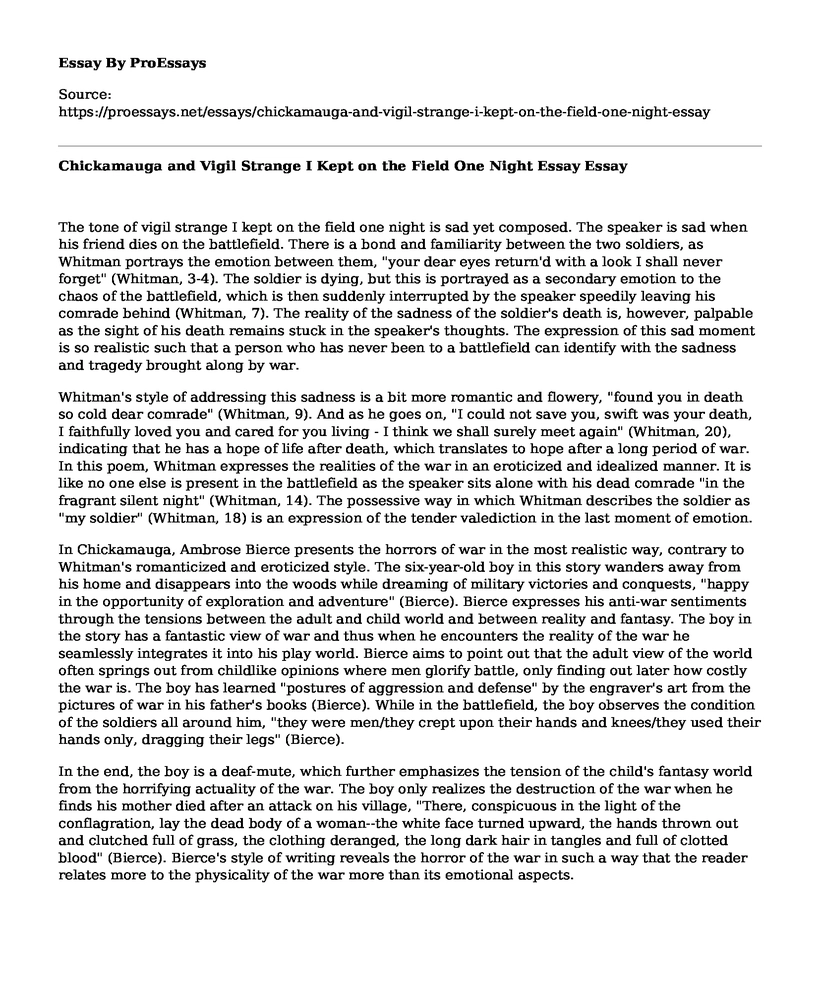The tone of vigil strange I kept on the field one night is sad yet composed. The speaker is sad when his friend dies on the battlefield. There is a bond and familiarity between the two soldiers, as Whitman portrays the emotion between them, "your dear eyes return'd with a look I shall never forget" (Whitman, 3-4). The soldier is dying, but this is portrayed as a secondary emotion to the chaos of the battlefield, which is then suddenly interrupted by the speaker speedily leaving his comrade behind (Whitman, 7). The reality of the sadness of the soldier's death is, however, palpable as the sight of his death remains stuck in the speaker's thoughts. The expression of this sad moment is so realistic such that a person who has never been to a battlefield can identify with the sadness and tragedy brought along by war.
Whitman's style of addressing this sadness is a bit more romantic and flowery, "found you in death so cold dear comrade" (Whitman, 9). And as he goes on, "I could not save you, swift was your death, I faithfully loved you and cared for you living - I think we shall surely meet again" (Whitman, 20), indicating that he has a hope of life after death, which translates to hope after a long period of war. In this poem, Whitman expresses the realities of the war in an eroticized and idealized manner. It is like no one else is present in the battlefield as the speaker sits alone with his dead comrade "in the fragrant silent night" (Whitman, 14). The possessive way in which Whitman describes the soldier as "my soldier" (Whitman, 18) is an expression of the tender valediction in the last moment of emotion.
In Chickamauga, Ambrose Bierce presents the horrors of war in the most realistic way, contrary to Whitman's romanticized and eroticized style. The six-year-old boy in this story wanders away from his home and disappears into the woods while dreaming of military victories and conquests, "happy in the opportunity of exploration and adventure" (Bierce). Bierce expresses his anti-war sentiments through the tensions between the adult and child world and between reality and fantasy. The boy in the story has a fantastic view of war and thus when he encounters the reality of the war he seamlessly integrates it into his play world. Bierce aims to point out that the adult view of the world often springs out from childlike opinions where men glorify battle, only finding out later how costly the war is. The boy has learned "postures of aggression and defense" by the engraver's art from the pictures of war in his father's books (Bierce). While in the battlefield, the boy observes the condition of the soldiers all around him, "they were men/they crept upon their hands and knees/they used their hands only, dragging their legs" (Bierce).
In the end, the boy is a deaf-mute, which further emphasizes the tension of the child's fantasy world from the horrifying actuality of the war. The boy only realizes the destruction of the war when he finds his mother died after an attack on his village, "There, conspicuous in the light of the conflagration, lay the dead body of a woman--the white face turned upward, the hands thrown out and clutched full of grass, the clothing deranged, the long dark hair in tangles and full of clotted blood" (Bierce). Bierce's style of writing reveals the horror of the war in such a way that the reader relates more to the physicality of the war more than its emotional aspects.
Works Cited
Bierce, Ambrose. Chickamauga. Charles River Editors via PublishDrive, 2018.
Whitman, Walt. "Vigil strange I kept on the field one night." Valley Men 4.1 (1990): 14.
Cite this page
Chickamauga and Vigil Strange I Kept on the Field One Night Essay. (2022, Aug 01). Retrieved from https://proessays.net/essays/chickamauga-and-vigil-strange-i-kept-on-the-field-one-night-essay
If you are the original author of this essay and no longer wish to have it published on the ProEssays website, please click below to request its removal:
- A Literary Essay Example on The Odyssey by Homer
- Literary Analysis Essay on Henrik Ibsen's "A Doll's House" Play
- Essay Sample on Robert Walton Serves as a Foil Character for Victor Frankenstein
- All My Sons by Arthur Miller Essay Example
- Critical Essay on Racism in Brave New World
- Literary Analysis Essay on Symbolism in Orwell's 1984
- Essay Example on Howard Hughes: Success Despite OCD







